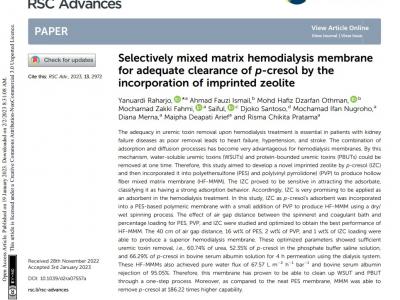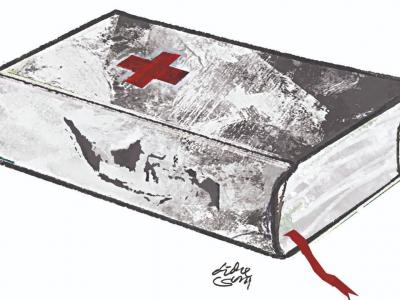
#english

Selectively mixed matrix hemodialysis membrane for adequate clearance of p-cresol by the incorporation of imprinted zeolite
- Artikel Ilmiah
- /
- 02/02/2023
Abstract The adequacy in uremic toxin removal upon hemodialysis treatment is essential in patients with kidney failure diseases as poor removal leads to heart failure, hypertension, and stroke. The combination of adsorption and diffusion processes has become very advantageous for hemodialysis membranes. By this mechanism, water-soluble uremic toxins (WSUTs) and protein-bounded uremic toxins (PBUTs) could be removed at one time. Therefore, this study aimed to develop a novel imprinted zeolite by p-cresol (IZC) and then incorporated it into polyethersulfone (PES) and poly(vinyl pyrrolidone) (PVP) to produce hollow fiber mixed matrix membrane (HF-MMM). The IZC proved to be sensitive in attracting the adsorbate, classifying it as having a strong adsorption behavior.

Acute Kidney Failure according to UNAIR Nephrologist
- Berita
- /
- 21/12/2022
UNAIR NEWS – The rise of mysterious cases of acute kidney failure in early October has been a hot topic. Approximately 131 children in 14 provinces in Indonesia experienced acute kidney failure, the cause was unknown at that time. The Food and Drug Supervisory Agency (BPOM) then gave a statement that the cause of acute kidney failure in children was due to the consumption of syrup containing chemicals that exceeded the threshold, such as Ethylene Glycol (EG) and Diethylene Glycol (DEG). According to Prof. Djoko Santoso dr. PhD SpPD KGH FINASIM, an Internal Medicine Professor of Universitas Airlangga (UNAIR) and Kidney-Hipertension Consultant, acute kidney failure is a disruption of kidney function that happens fast and suddenly marked by the increase of creatinine serum or decreasing urine production.

2023 Health Agenda
- Opini
- /
- 16/12/2022
Let's close 2022 with optimism, hopefully the pandemic status of COVID-19 can be revoked in 2023. And we hope that the health transformation will increase Indonesia's health resilience. We also hope that there can be a solution to the pros and cons regarding the Health Bill (RUU). Recently, there was a wave of protests against the Omnibus Health Bill, which was an initiative of the House of Representatives (DPR). Several health and medical professional institutions, such as the Indonesian Doctors Association (IDI), the Indonesian Dentists Association (PDGI), the Indonesian Pharmacist Association (IAI), the Indonesian National Nurses Association (PPNI), the Indonesian Association of Medical Laboratory Technologists (Patelki) and the Indonesian Midwives Association (IBI) voiced their anxiety.

Our National Health
- Opini
- /
- 27/11/2022
An increase in life expectancy in the span of 30 years is actually a reasonable achievement. What seems to be beyond rationality is why stunting remains an insurmountable problem. The November 2022 issue of TheLancet journal published Indonesia's national health report, which provides an overview of Indonesia's health over the past 30 years and its capacity to meet the United Nations' (UN) Sustainable Development Goals (SDGs). The report, titled "The State of Health in Indonesia's Provinces, 1990-2019: A Systematic Analysis for the Global Burden of Disease Study 2019”, was compiled by the GBD 2019 Indonesia Subnational Collaborators. It was prepared by a team involving dozens of researchers, including former Health minister Nafsiah Mboi (2012-2014).

Blood Clotting and the Accusation of Haram Vaccine
- Opini
- /
- 19/10/2022
The Astrazeneca vaccine has made a fuss. According to a recent study from the European Medicines Agency (EMA), which has its headquarters in Amsterdam, the Astrazeneca vaccine is strongly suspected of having potentially fatal blood clot side effects. Shortly thereafter, the UK's Medicines and Healthcare Products Regulatory Agency (MHRA) disclosed that it may have found evidence of a connection between blood clot cases and the Astrazeneca-Oxford vaccine. The EMA and MHRA reports immediately sparked concern in the European region. Eleven countries in Europe instantly suspended the use of the Astrazeneca vaccine, followed by Thailand. In Indonesia there have been no cases of blood clots due to the vaccine, but, pending further studies, the Minister of Health, Budi Gunadi Sadikin, announced the suspension of the use of Astrazeneca vaccine (15/3/2021).